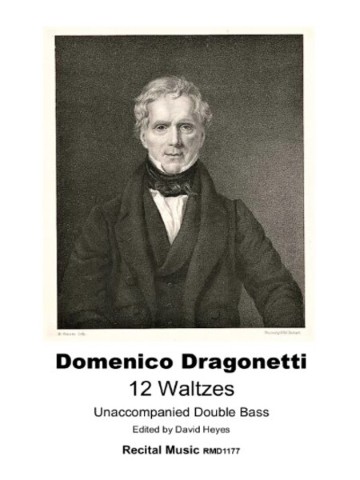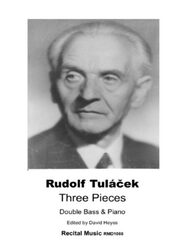12 Waltzes for Double Bass

Composer: Dragonetti, Domenico
Editor: David Heyes
Instrumentation: Unaccompanied Double Bass
Publisher:
| Product Code: | RMD1177 |
| Publishers Number: | RMD1177 |
| Language: | English |
| Condition: | New |
Dragonetti began playing the guitar and double bass at a young age, and by the age of thirteen, he was appointed principal player at the Opera Buffa in Venice. He later worked at the Chapel of San Marco and at the Grand Opera in Vicenza. His talent was recognized throughout Europe, and he turned down several opportunities, including offers from the Tsar of Russia.
In 1794, Dragonetti moved to London to play in the orchestra of the King’s Theatre and settled there for the remainder of his life. He became a prominent figure in the musical events of the English capital, performing at the concerts of the Philharmonic Society of London and meeting influential persons like the Prince Consort and the Duke of Leinster.
Dragonetti was acquainted with composers Joseph Haydn and Ludwig van Beethoven, whom he visited on several occasions in Vienna. He showed them the possibilities of the double bass as a solo instrument and influenced Beethoven’s music, particularly in the Fifth Symphony where double basses frequently double with the cellos.
He is also remembered for developing the Dragonetti bow. It is characterized by its convex (outwardly curved) shape, a design that Dragonetti pioneered and used to achieve a unique and powerful sound. This bow has a convex shape (the stick of a Dragonetti bow curves away from the hair) which allowed Dragonetti to produce a robust, percussive staccato and a powerful sound overall, making it a popular choice for his style. Dragonetti’s innovative bow and playing technique helped establish the double bass as a solo instrument and influenced subsequent generations of double bassists. Dragonetti bows are known for their excellent attack of staccatos and their suitability for a wide range of musical styles, from the Sturm und Drang period to the Classical era. which he used throughout his life to enhance his performances.
His “Twelve Waltzes for Unaccompanied Double Bass” are particularly famous and well-regarded for their virtuosity. Additionally, he composed a concerto in G major and a quintet in G major, among other works. His influence extended to Beethoven, who was impressed by Dragonetti’s double bass skills and even collaborated with him.
Key works by Domenico Dragonetti:
Twelve Waltzes for Unaccompanied Double Bass: Considered his most famous and virtuosic work.
Concerto for Double Bass and Orchestra in A major: A notable concerto showcasing his skills.
Double Bass Concerto in G major, D290: Another important concerto composition.
Duo in B flat Major for cello and double-bass: A piece showcasing the interplay between two instruments.
Quintet in G Major: A chamber music work.
“The Famous Solo”: A showpiece piece, originally for double bass and orchestra, but also arranged for double bass and quartet.
Domenico Dragonetti passed away on April 16, 1846, in London.
These waltzes were particular favourites of Dragonetti and were discovered amongst his manuscripts after his death in 1846. Each has its own charm and character,…
This edition has returned to the original manuscript to create a playable edition with a limited number of editorial additions. Overall, this edition is very close to the composer’s original intentions, with the occasional slur or articulation added if they were included in a similar phrase.
There are many opportunities for bassists to add dynamics and new articulations to create unique interpretations with the intention of bringing these charming and stylish early 19th- century waltzes to new audiences today.
“These extraordinary specimens of “the Waltz style” as applied to the capabilities of such an instrument as the Double Bass were some of the last “playful Exercises” which Dragonetti wrote to evince his wonderful command over that Gigantic instrument. He was fond of playing them to me in his own room (although no terms ever induced him to perform them in public), as he knew that I was acquainted with the complete and usual limits of the contrabasso in the hands of other performers, and that I therefore was perfectly aware of what was going forward when he was applying his own system of bowing, peculiarity of expression, striking character et cetera, to them; and certainly the mode in which he performed these admirable and masterly compositions of their class, was such as I never expect to hear again accomplished, as long as I may live; and which will probably never again be heard by anyone, on the Double Bass, as long as the world lasts.” [Vincent Novello]
In 1849, three years after the death of Domenico Dragonetti (1763-1846) and before he retired to Italy, Vincent Novello (1781-1861) donated Dragonetti’s manuscripts to the British Library. Novello, an executor to Dragonetti’s will, had tried to collate and organize the vast collection of manuscripts. The words above, oft-quoted, were written on the first page of the Twelve Waltzes for unaccompanied double bass. They give a clear indication of their close friendship and also of Novello’s great admiration for the famous double bassist.
Novello was present when Dragonetti died, inherited most of his archive, and, thanks to his foresight, the eighteen volumes of manuscripts have survived to the present day.
Digital Download – PDF
Shipping costs: No shipping
R.R.P £8.50
Our Price: £7.23
You might also like
-
20 Melodic Pieces Book 1
£7.23 -
3 Pieces for Double Bass and Piano
£10.63 -
3 Random Rambles
£7.23 -
6 Christmas Carols
£10.63




